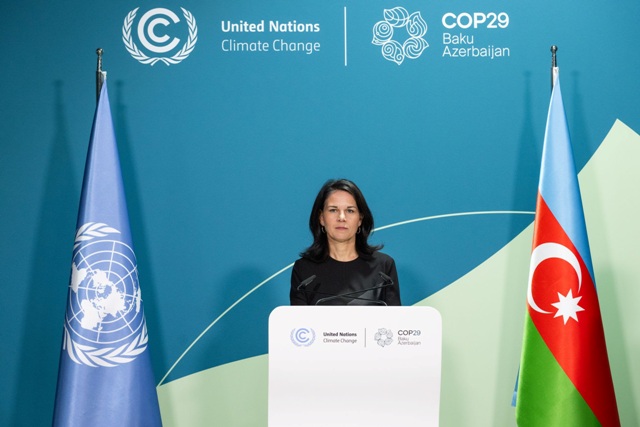Admin I Sunday, Nov. 24, 2024
BAKU – German Foreign Minister Annalena Baerbock defended the decision of the UN Climate Conference for additional financial aid for poorer countries amidst sharp criticism from those nations, one of which called the agreement a “joke” and an “insult.”
“We know that our decisions today won’t alone be enough to meet all the needs,” Baerbock said in the wee hours of Sunday morning before the plenary session in Baku, the capital of Azerbaijan. This is why we got behind the vision of scaling up finance for developing countries to $1.3 trillion,” she said.
Of the $1.3 trillion agreed to be provided annually through 2035, some $300 billion is to mainly come from industrialized countries. Baerbock said this could only be a starting point and she assured participants that Germany would “deliver.
“Because we learned from our mistakes in the past – we cannot sign a check that will bounce – this is also about trust.”
She said the European Union is aware of its responsibilities. “For the EU it is crystal clear: Nobody forgot about historical responsibility.” Baerbock stressed that climate protection financing and progress in reducing greenhouse gases could and should not be separated.
“Without concrete measures to keep the 1.5 degrees path within reach, no money in the world will save us,” she added.
In an obvious reference to states like oil-rich Saudia Arabia, who are trying to block progress that moves nations away from oil, Baerbock said: Those who have come here to prevent progress and to weaken our multilateral UN system altogether, have failed – badly.
“And those who believe in a better world have won.”
Meanwhile, the German government has continued to speak on achievement at COP29. “The results from Baku are no cause for celebration, the progress made is too small for that,” said Development Minister Svenja Schulze.
But, “In future, more people will take on responsibility than before,” she added. The event, which was extended by 30 hours to resolve the financial commitments of participants, was close to failing before a compromise was reached.
However, several countries were still outraged at the outcome, with Nigeria’s representative calling the $300 billion asked annually of industrialized countries until 2035 a “joke” and an “insult.”
Germany, meanwhile, sought solace in the wider possibilities that emerged.
A commitment by a small group of industrialized countries will now become a “joint global task” to which other countries will also contribute, according to Schulze. “That is an important signal.”
It was crucial that private investments worldwide are channelled into climate-friendly paths on a major scale. This was reflected by the new overall target of $1.3 trillion annually through 2035 to help poorer countries fight climate change, she noted.
“This can be achieved through good framework conditions, government incentives and fair international cooperation,” said Schulze.
Economy Minister Robert Habeck focused on the same points: “In view of the tense global situation, this is a success for international cooperation.” The negotiations at UN level were working, even if there were still many unresolved issues that would need to be discussed in the coming year, he noted.
“It is pleasing that the states have adopted solid rules for the carbon markets as part of the Paris Agreement and that these mechanisms can now be utilised,” said Habeck.
Even holdouts such as Saudi Arabia “will not be able to stop the real market forces that have long since decided in favour of renewable energies and the climate-neutral transformation,” he added.
